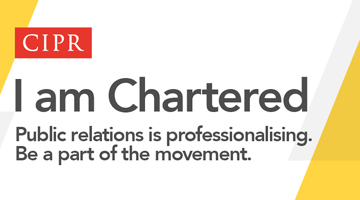 Why get Chartered?
Why get Chartered?
I’m frequently asked if it’s worth doing the assessment to achieve
Chartered status, to which I always answer yes. The supplementary question is inevitably about how difficult it is, which is predominantly what I want to tackle here.
It’s robust, rigorous and challenging, which is one of the many reasons it’s worth doing, and probably the main reason people are put off.
The CIPR describes Chartership as the highest level of professional accreditation it can confer on practitioners who meet the ‘required standard of professional distinction’.
Distinction and excellence is what it’s all about. As PR professionals we should be prepared to give our best at all times, and being chartered is one of the ways we can help demonstrate that.
It’s right to feel a degree of nervousness and trepidation. At the assessment you stand before your peers and demonstrate your integrity, leadership, and strategic understanding, in a friendly and relatively informal setting. But it’s not an exam - it’s evidence of you in context, your moral compass, how you practice, what you bring to the table.
Being assessed by peers for me is the most valuable part of the exercise, and the most daunting. Validation from those we admire and respect is much worthier than any sort of laurel from those without understanding of our roles and challenges.This is an opportunity for self-reflection, on the day and generally. The assessment judges us on ethics, leadership and strategy, the dilemmas they present and how we approach them. Just as in our day jobs we get out as much as we put in, so too with the assessment. We should always be prepared to share our views, to discuss and at times to challenge, whether at work, in network meetings or being assessed for Chartership. One of the great things about the day is getting to hear from peers working in other sectors and industries, their experiences and ideas.
Therefore, it is right that the assessment is rigorous and you should be nervous going into it, because I am assuming you take your role seriously, give your best self with professionalism and integrity and taking an easy option would not be in your DNA. You’re a member of the CIPR and you’ve completed at least the minimum number of annual CPD cycles, which I feel is already evidence of self-reflection and development,
and therefore puts you well on your way to Chartership.
The formal assessment ends with a peer review of a two-year CPD plan, which though not formally assessed, is a crucial make or break element and two of your fellow practitioners will have to sign it and commit you to it.
You find out on the day if you’ve made the grade. Then you can wear it as a badge of honour to demonstrate you’ve attained a gold standard within your industry, and that you’re prepared to maintain that in your everyday practice. It is not a hurdle to overcome and forget about, but then we’ve already established that you are a thinker and someone for whom self and career development are important.
Is it difficult? Yes, but well worth the effort. It’s a benchmark that will help reassure employers that you practice to the highest standards, and will help enhance your career prospects as you progress. I wholeheartedly recommend you go for it. Good luck!
Got questions? Want to hear from two other Chartered PR Practitioners in East Anglia? Join this free webinar on 10 March.